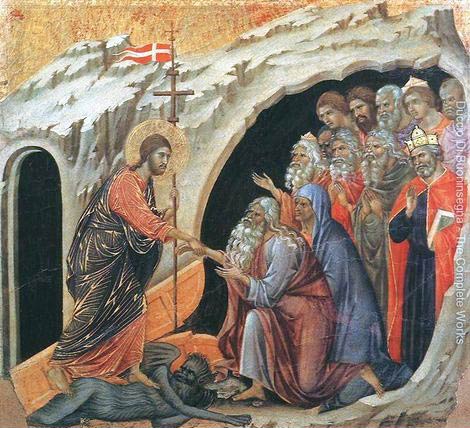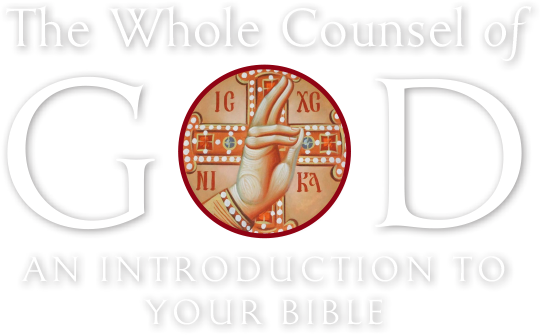 Psalm 24 (23 in the Greek collection) is a Psalm deeply immersed in the religious world of ancient Israel. The Psalm represents a specific polemic against the pagan beliefs of her Canaanite, Phoenician, and Syrian neighbors. This Psalm mocks the pretensions of the demonic being whom they have chosen to worship directly and specifically. The means for understanding the context into which Psalm 24 was written and the beliefs against which it was directed lay buried in the sand in Lebanon for more than 3,000 years. Nevertheless, the original meaning of this Biblical text was maintained in the Orthodox Church until the present day through its liturgical usage. This text is, therefore, not only a prime example of the way in which ancient Israel understood and interacted with neighboring pagan beliefs, but also a prime example of the way in which Holy Tradition works in preserving and communicating the truths expressed in scripture.
Psalm 24 (23 in the Greek collection) is a Psalm deeply immersed in the religious world of ancient Israel. The Psalm represents a specific polemic against the pagan beliefs of her Canaanite, Phoenician, and Syrian neighbors. This Psalm mocks the pretensions of the demonic being whom they have chosen to worship directly and specifically. The means for understanding the context into which Psalm 24 was written and the beliefs against which it was directed lay buried in the sand in Lebanon for more than 3,000 years. Nevertheless, the original meaning of this Biblical text was maintained in the Orthodox Church until the present day through its liturgical usage. This text is, therefore, not only a prime example of the way in which ancient Israel understood and interacted with neighboring pagan beliefs, but also a prime example of the way in which Holy Tradition works in preserving and communicating the truths expressed in scripture.
As is apparent from even a cursory reading of the historical books of the Old Testament, the chief deity of Israel’s neighbors was Baal. Baal’s cult also emerges over and over again within Israel and even Judah as a rival to the worship of Yahweh, the God of Israel. Baal’s mythic narrative was discovered at Ugarit during its excavation between 1928 and 1970. The tablets containing its texts had been buried since the fall of the city c. 1180 BC. The narrative arc of the story of Baal is familiar within Mediterranean and Mesopotamian paganism, with Baal ascending to head the council of the gods through struggle and the overthrow of the previous high god. He, therefore, parallels Zeus, Marduk, and other similar figures. Due to the proximity of his worshippers, however, he was the figure most commonly referenced by the authors of scripture.
In the ancient world, it was common for official histories issued by kings to be heavily propagandized. One Pharaoh, for example, created a mural boasting of a great victory in which he lost tens of thousands of troops and a significant amount of territory. The Israelite understanding of the Baal cycle was very similar. It was interpreted as a propagandized document attempting to spin the devil’s defeat into a victory. In the Baal cycle, Baal first faces a conflict with Yam, the sea, who is currently the king reigning over the gods, and his head of the council, Nahar, the river, described as a prince. Baal rebels against the high god and his son who governs the divine council and in the Baal cycle is victorious. He follows his victory and ascending to the throne of the council as a prince with the construction of a massive palace to represent his greatness and power. Finally, as almost an epilogue, he has a final grudge match with Mot, or death, and once victorious establishes himself as the lord of the underworld and the dead as well. In Genesis 3, with the curse placed upon the serpent, and the parallel prophetic passages describing the fall of the devil in Isaiah 14 and Ezekiel 28, Israel understood that in actuality the devil had been a cherub or seraph who sought to seize the throne of God the Son at the head of the divine council and had been thrown down to the earth to become the lord of only the underworld, holding only the power of death. The Baal cycle can therefore easily be seen as a way for the devil to attempt to characterize his defeat as a series of victories in order to seek the worship of the nations. Baal was still identified with the devil well into the New Testament period (eg. Matt 10:25; 12:24-27; Mark 3:22; Luke 11:15-19).
Psalm 24 represents a riposte to this propaganda on the part of the worshippers of Baal. The Psalm begins by saying that the earth and everything in it belongs to Yahweh. This is so because he has founded it upon the seas (yam) and established it upon the rivers (nahar). Creation belongs to Yahweh as the one who created it. It still belongs to Yahweh because neither Baal nor anyone else is able to take it from him. It is Yahweh who has defeated chaos, as represented by these water powers, and brought forth order. The Psalm continues to describe who it is who is able to dwell on the mountain of Yahweh and stand in the holy place of his presence (v. 3). This is something which the devil can no longer do. Rather, this has been given to humans who have clean hands a pure heart. It belongs to those who are free from deceit and do not participate in false worship (v. 4). These will receive blessing, righteousness, and life from the God of Israel. They will receive these things in the future despite the current state of affairs. The first verse of Psalm 24 is prayed at the anointing of the body at an Orthodox funeral as a defiant statement to the devil and a reminder that he no longer has any claim over the departed.
The address to Baal, the lord of the dead, in this Psalm makes clear that it is speaking concerning the righteous dead. Due to the failure of his rebellion, all that has been left to the devil has been to claim those who sin and die. The righteous, however, do not belong to him and their destiny is to receive the place with God which the devil lost through envy. To that end, the remainder of the Psalm describes an assault by Yahweh himself upon Baal’s palace in the underworld to set them free.
Within the Baal cycle, there is a critical moment in Baal’s ascent to power. Baal has begun fomenting his rebellion among the gods and this includes trading missives with Yam and Nahar. As the conflict heads toward inevitable violence, messengers (lit. angels) arrive from Yam and Nahar to tell Baal and his minions to submit. As soon as they arrive, the other gods, sitting upon their thrones in the council, literally bend down and put their heads between their legs in submission. This causes Baal to give an impassioned motivational speech. The refrain within Baal’s speech is, “Lift up your heads, O you gods!” After the conclusion of this rousing speech, Baal proceeds to murder the messengers and go out to battle and kill Yam and Nahar (Baal, I.II.24-29).
In Psalm 24, as Yahweh’s assault upon the gates of Baal’s palace in the underworld begins, it begins with these words of Baal being used against him in mockery (v. 7, 9). These words which the devil claims he spoke as he began his rebellion are now thrown back in his face as Yahweh comes to take from him even that little power, that of death, which remains to him in the rescue of his righteous ones. Yahweh strong and might, Yahweh mighty in battle, Yahweh of military hosts has come to bring salvation to his righteous ones, to destroy the gates of Baal’s palace and take them to dwell with him upon his holy mountain of assembly.
Christianity has always seen the assault envisioned by Psalm 24 as having taken place in the death and resurrection of Christ. Among many of the Fathers, it is seen as the very reason for the incarnation. The Son of God became man so that he could die. He died so that he could be swallowed up by death as was Jonah and emerge victorious with the righteous dead from the whole human race. The harrowing of Hades is described in scripture (eg. Matt 12:29; Mark 3:27). It is depicted in iconography. It is a constant theme of the hymnography of the resurrection. Most importantly, however, it is ritually enacted and participated in by the Christian faithful in the Rush Service of Pascha. Just as the Jewish Passover celebration served as a ritual to bring future generations into the event of the Exodus, so also this ritual of the Christian Passover brings each generation of Christians through the experience of Yahweh, Christ our God’s raid on the devil’s palace in Hades. For 2000 years, Christians have lived and died after this event. But in its annual ritual celebration, they have entered into this event, participated in and experienced it in reality, by passing through darkness into light as Christ burst through the ancient gates. In the celebration of Pascha, every Christian comes to share the experience of the righteous dead from before the advent of Christ. We have passed from death to life.

What a magnificent and appropriate topic for Good Friday!. Blessings, Father!
Just as the poetry of the Psalms “speak” to us a reality in which prose falls short…
” “Lift up your heads, O you gods!” …
the same for rituals. Except rituals go a step farther and re-enact a presence, where words of logic can not but fall short…
“in its annual ritual celebration, [Christians] have entered into this event, participated in and experienced it in reality, by passing through darkness into light as Christ burst through the ancient gates.”
Amen Father! Thank you so much.
Such a rich heritage we have!
Who is this King of glory?
The Lord of hosts,
He is the King of glory.
Glory to Jesus Christ!
A very blessed Pascha to you.